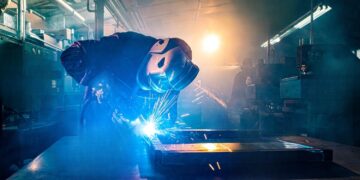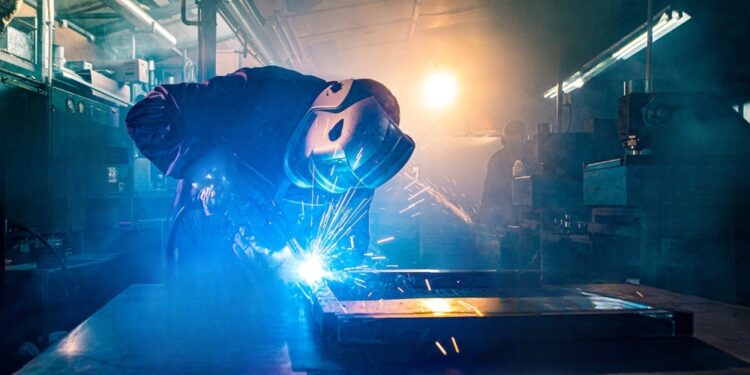In the dynamic world of metal fabrication, arc welding machines have emerged as transformative tools, revolutionizing the welding industry. From small-scale workshops to large industrial complexes, these machines play a pivotal role in joining metals, shaping structures, and contributing to the backbone of modern construction. This article delves into the profound impact of arc welding machines and explores the significance of choosing reliable manufacturers in the pursuit of quality and efficiency.
The Rise of Arc Welding Machines:
Arc welding, a process that employs an electric arc to melt and fuse metals, has been a staple in the welding industry for decades. However, the introduction of arc welding machines marked a significant leap forward, automating and streamlining the welding process. These machines utilize various techniques, including shielded metal arc welding (SMAW), gas metal arc welding (GMAW), and tungsten inert gas welding (TIG), offering versatility across a wide range of applications.
Impact on the Welding Industry:
The advent of arc welding machines has had a profound impact on the welding industry, fundamentally altering the landscape of metal fabrication. One of the key contributions lies in the enhanced efficiency and precision these machines bring to the welding process. Automated arc welding reduces human error, accelerates production timelines, and ensures consistent weld quality, resulting in cost-effective and reliable outcomes.
Moreover, arc welding machines have enabled welders to tackle complex projects with greater ease. The versatility of these machines allows for the welding of various metals, ranging from carbon steel and stainless steel to aluminum and exotic alloys. This adaptability positions arc welding machines as indispensable tools across diverse industries, including automotive, aerospace, construction, and manufacturing.
Benefits of Quality Manufacturers:
When considering the purchase of arc welding machines, the choice of arc welding machine manufacturer becomes paramount. Opting for a reputable and quality-focused manufacturer brings a myriad of benefits to the table.
1. Reliability and Performance:
Established manufacturers adhere to rigorous quality standards, ensuring their machines are reliable and perform optimally under varying conditions.
- Quality control measures, such as thorough testing and inspections, guarantee that each machine meets or exceeds industry benchmarks.
2. Innovation and Technology:
- Reputable manufacturers invest in research and development to stay at the forefront of technological advancements.
- Innovations in arc welding machine design, control systems, and automation contribute to increased efficiency and precision in welding processes.
3. Comprehensive Support and Service:
- Trusted manufacturers provide comprehensive customer support, including training, technical assistance, and readily available spare parts.
- A robust after-sales service ensures that users can address any issues promptly, minimizing downtime and maximizing productivity.
4. Safety Compliance:
- Quality manufacturers prioritize safety features and compliance with industry standards, reducing the risk of accidents and ensuring a secure working environment.
5. Warranty and Longevity:
- Reputable manufacturers often offer extended warranties, reflecting their confidence in the durability and longevity of their products.
- Investing in a machine from a reliable manufacturer ensures a longer operational life, delivering value for the initial investment.
Metals Welded by Arc Welding Machines:
Arc welding machines exhibit remarkable versatility in welding various metals, making them essential tools for diverse applications. Common metals welded by these machines include:
1. Carbon Steel:
- Widely used in construction and manufacturing, carbon steel is a primary material welded with arc welding machines.
2. Stainless Steel:
- Arc welding is employed to join stainless steel components in industries such as food processing, pharmaceuticals, and automotive.
3. Aluminum:
- Gas metal arc welding (GMAW) and tungsten inert gas welding (TIG) are commonly used for aluminum welding, applicable in aerospace, automotive, and marine industries.
4. Exotic Alloys:
- Industries like aerospace and defense often require the welding of exotic alloys, where arc welding machines demonstrate their adaptability and precision.
Conclusion:
In conclusion, arc welding machines have undeniably transformed the welding industry, providing unparalleled efficiency, precision, and versatility. The impact of these machines extends across various sectors, contributing to the construction of structures, vehicles, and machinery that define our modern world. Choosing a reliable and quality manufacturer is crucial for ensuring optimal performance, safety, and long-term value. As these machines continue to evolve, their role in shaping the future of metal fabrication remains pivotal, reinforcing their status as indispensable tools in the hands of skilled welders and manufacturers.




















































